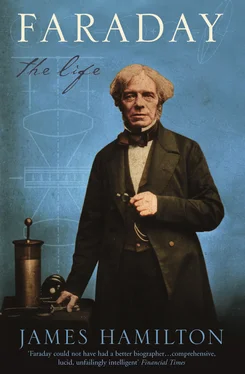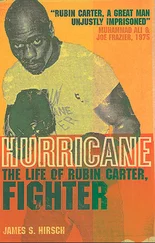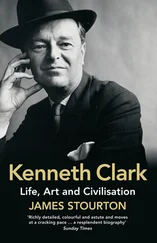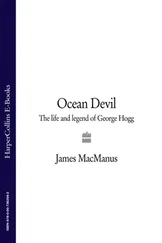Faraday gave his notice to de la Roche, and took up his duties at the Royal Institution straight away. Released from the pressures he had been under with the bookbinder, he immediately felt the illusion of greater leisure. Davy and his colleagues may have introduced him gradually to his new responsibilities, but whether or not this was the case, he was now doing what he had longed to do. A week after starting at the Royal Institution he wrote his first letter to Abbott for three months, and looked forward to the pleasures of a ‘recommenced & reinvigorated correspondence’. 51He reread Abbott’s past letters – there had been five since December which he had not answered – and mused on what he might have been doing in his old life: ‘It is now about 9 o’clock & the thought strikes me that the tongues are going both at Tatum’s and at the Lecture in Bedford Street but I fancy myself much better employed than I should have been at the Lecture at either of these places.’
Then he runs through for Abbott a typical day at the Royal Institution: he has assisted John Powell at a thinly-attended Mechanics lecture on rotatory motion – he ‘had a finger in it (I can’t say an hand for I did very little)’, and has been working with Sir Humphry on extracting sugar from beet, an extremely important piece of research, because the threat of French naval blockades still hampered the import of sugar from the West Indies. He and Davy were also ‘making a compound of Sulphur & Carbon’, that is, carbon disulphide, ‘which has lately occupied in considerable degree the attention of chemists’. 52Jöns Berzelius and Alexander Marcet’s article on ‘sulphuret of carbon’ had just been published in the Royal Society’s Philosophical Transactions, and already Davy was testing the procedure for himself, and giving Faraday further insight into laboratory practice.
Davy had been very specific about Faraday’s duties, the times he would be required in attendance, and when he would have time off. Faraday was able to go home to see his mother and family in Weymouth Street on most evenings, but knew that he could not join Abbott on the coming Wednesday at the City Philosophical Society because ‘I shall be occupied until late in the afternoon by Sr H Davy & must therefore decline seeing you at that time’. Nonetheless he hopes and expects to see his friend every Sunday as far as possible.
There is a perceptible change in tone from the earlier set of letters to those Faraday wrote to Abbott over the next six months, a growing self-confidence as he spent his days beside Davy in the laboratory, and a stronger philosophising manner in which he uses the letters to outline his developing views. One letter, which he describes as ‘patch work’, he claimed to have begun with no connected thought in his head, ending it with an analysis of man, as if ‘man’ were a chemical compound: ‘compound’, indeed, is the keyword:
What a singular compound is man – what strange and contradictory ingredients enter into his composition – and how completely each one predominates for a time according as it is favoured by the tone of the mind and senses and other existing circumstances. 53
Faraday lists man’s ‘contradictory ingredients’ as ‘grave circumspect & cautious’ and ‘silly headstrong & careless’; ‘conscious of his dignity’ and ‘beneath the level of the beasts’; ‘free frivolous & open his tongue’, then ‘ashamed of his former behaviour’. There is a maturity in this reflection which already marks out the self-educated young man. Faraday’s life had changed radically in the past few weeks. At twenty-two years of age he had been reborn as a natural philosopher newly apprenticed to the greatest teacher of the subject in the land.
Faraday’s rooms high up at the back of 21 Albemarle Street overlooked Jacques Hotel in Bond Street, a noisy place of parties and dinners, music and dancing. The night before he philosophised to Abbott about the ingredients of man he was distracted from the beginning of his letter by loud music from a ‘grand party dinner’ at the hotel. An orchestra had been hired to play that evening, ‘bassoons violins clarinets trumpets serpents and all other accessories to good music’, and with every new piece they played, Faraday could not ‘for the life of me help running … to the window to hear them’. 54His natural jollity and good humour, his love of good companionship that had led him to play the flute and know ‘a hundred songs by heart’, 55to enjoy fireworks in Ranelagh Gardens and any number of river and country outings, led him also to share with his friend his excitement at the changes in his life, which had flowed directly from his determination to follow science.
Once he had been shown the door into the Royal Institution, everything that happened subsequently to Faraday came as a result of his own efforts, determination and self-possession. The letters to Abbott amply demonstrate the calibre of the intellect that Riebau had taken on as an apprentice, and that Sir Humphry Davy had now engaged. Within three months of starting as Davy’s assistant, Faraday had become by observation as much an expert on lectures and lecturing techniques as anybody in London. There are four long letters to Abbott which examine in detail the finer and the coarser points of the art of lecturing, and consider too a lecturer’s needs, his equipment, illustrations, the design of the lecture theatre, its ventilation, seating, sight-lines, and entrance and exit arrangements. The most extraordinary thing about this is that Faraday, who had done no public lecturing himself, and who had not experienced any university lecturing, with its syllabuses, regular classes and so on, should so rapidly find the key to clarity in an art that was so widely abused. His notes, since they were first published in 1870, 56have for more than a hundred years been widely and influentially used as benchmarks to guide aspiring lecturers. The only other person in Faraday’s ken who had come to lecturing afresh was Sir Humphry Davy himself in his professional journey from Penzance and Bristol to London. Between them they comprised the new wave of lecturing techniques, and re-invented the art.
Sir Humphry Davy threw Faraday in at the deep end. A month after he had begun at the Royal Institution, Faraday was working with Davy on the same nitrogen trichloride that had blown Dulong’s finger off, and sent glass into Davy’s eye. Faraday coolly told Abbott, ‘I have been engaged this afternoon in assisting Sr H in his experiments on it during which we had two or three unexpected explosions.’ 57
We know practically all there is to know about how to make nitrogen trichloride from Faraday’s letters to Abbott. The new explosive had great military potential, and, from the post-Cold War perspective of two hundred years later, it is revealing how unconcerned Davy, a man of the establishment and deeply anti-French, was about the security of information about the explosive.
Davy may not have given his assistant much warning about what might happen when the greasy, butter-like compound, which smelt curiously of almonds, was put into a basin of water, and then phosphorus was added to it. They concocted the compound itself the same day by making up solutions of ammonium nitrate and ammonium chloride, and then, using a scrupulously clean air jar, inverting over them some ‘fresh made pure clean’ chlorine gas. There is a note of triumph in the expression of that recipe – Davy was inordinately proud of chlorine. There must be no trace of oil, grease or any other impurities anywhere in the equipment, and it was Faraday’s job to see that everything was spotless. By now Davy was fully confident of his assistant’s care and dexterity in handling fragile laboratory equipment, his attention to detail and his physical bravery. A month after taking Faraday on Davy was prepared to trust his young assistant to work side by side at the bench with him on murderous substances.
Читать дальше












